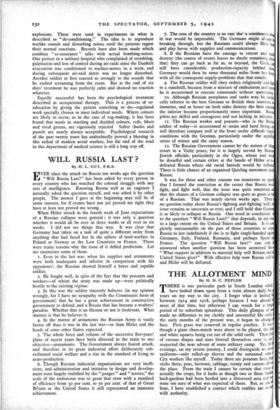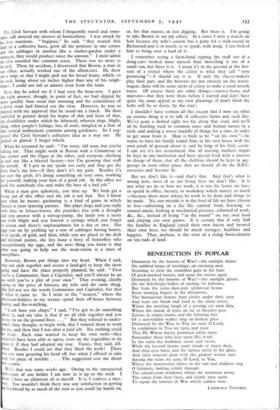THE ALLOTMENT MIND
By H. D. C. PEPLER
THERE is one particular park in South London which have looked down upon from a train almost daily for years on my way to the city. I forget what it looked between 1914 and 1918, perhaps because I was abroad most of that time, but otherwise I can vouch for a Ion period of its suburban splendour. This glimpse of made no difference to my clerkly and uneventful life until, the early months of the present war, it began to change face. First grass was removed in regular patches. It was though a giant chess-match were about to be played, the b and white squares being cut out of the solid earth. Then sh of various shapes and sizes littered themselves over it, and suspected the near advent of some military camp. Yetoll evenings, on my return journey, I could distinguish nc se uniforms—only rolled-up sleeves and the untanned arms City workers like myself. Today there are potatoes here, sticks there, peas, beetroot, cabbage, turnip and carrots all the place. From the train I cannot be certain that these actually the crops, for it looks as though two or three lain back-gardens had been herded into a distressed area and none too sure of what was expected of them. But, as you .hear, I have established a contact which enables me to with authority. The Civil Servant with whom I frequently travel and some- times talk noticed my interest in horticulture. I was struck by his first reactions. " Suppose," he said, " they treated that land on a collective basis, grew all the potatoes in one corner and the cabbages in another like a market-garden under a manager, they would produce twice the amount." I must admit his idea sounded like common sense. There was no more to be said. Then, by accident, I discovered that Brown, a man in our office, actually worked one of the allotments. He drew me a map, so that I might pick out his broad beans, which, so he said, being about six inches higher than any of his neigh- bours', I could not fail to admire even from the train.
Next day he asked me if I had seen the bean-row. I gave the right answer, though, in point of fact, we had slipped by more quickly than usual that morning and the coincidence of a down train had blotted out the view. However, he was so pleased with my approval that he stood-me a lunch. He then unfolded in greater detail his hopes of this and fears of that, the disabilities under which he laboured, wherein dogs, blight, dung, other people's failings, loss of tools, mingled in a flow of that cynical enthusiasm common among gardeners. So I sug- gested the Civil Servant's collective idea as a way out He gulped or glared, I forget which.
When he resumed he said: " I'm sorry, old man, but you're talking rot. That might work in Russia with a Commissar at one corner and the Ogpu at the other, and everyone clocking in and out like a blasted factory—but I'm growing that stuff for myself. If I put in my spuds too early and they get the frost that's my loss—if they don't it's my gain. Besides it's not just the grub, it's doing something on your own, working for yourself, making your best of a good job. In this office we work for somebody else and make the best of a bad job."
When a man gets aphoristic, you shut up. We both get a living out of this office and the job is not bad. But I know now what he meant; gardening is a kind of game in which Nature is your sparring partner. She plays slugs and you reply with lime or lettuce-leaves, she punishes you with a drought and you answer with a stirrup-pump, she lands you a nasty one with blight and you borrow a syringe which you forget to return and there's unpleasantness for a day or two. She eggs you on by pushing up a row of cabbages having hearts, so to speak, of gold, and then, while you are glued to the desk d decimal points, she lets loose a bevy of butterflies who surreptitiously lay eggs, and the next thing you know is that what was going to help out the meat-ration is a mass of caterpillars.
However, Brown put things into my head. When I said, why not club together and secure a land-girl to keep the show going and have the place properly planned, he said: " First you're a Communist, then a Capitalist, and you'll always be an ass until you've a plot of your own." That evening, chiefly owing to the price of lettuces, my wife said the same thing. he did not use the words Communist and Capitalist, but that s what it came to. So I went to the " nearest," where the lotment-holders in my terrace spend their off-hours between oeing and fire-watching.
" Look here you chaps," I said, " I've got to do something about it, and my idea is that if we all club together and you t me in on the ground-floor. . ." But they refused to under- tand; they thought, to begin with, that I wanted them to work or me, and then that I was after a paid job. No, nothing could done. Each man wanted to keep his own tools—they ouldn't have been able to agree, even on the vegetables to be lanted, if they had adopted my way. Tastes, they said, dif- ered. Besides I could see that they liked the work ! There as one man grousing his head off, but when I offered to take ver his piece of trouble. . . . The suggestion cost me about o quarts.
Well, that was some weeks ago. Owing to the unexpected rirement of one holder I am now in it up to the neck. I can I have an allotment all to myself. It is, I confess, a mys- cry. You wouldn't think there was any satisfaction in getting P bindweed by as much of the root as you could lay hands on, or, for that matter, m just digging. But there is. I'm going to take Brown to see my celery. In a sense I stole a march on him because my wife's cousin has a pony for a milk-round in Richmond and is in touch, so to speak, with dung. I just bribed him to bring over a load of it.
I remember seeing a farm-hand tipping the stuff out of a dung-cart—looked more natural than shovelling it out of a small van, but there it is. I mean it's in the ground at the bot- tom of a trench where the celery is what they call " very promising "—I should say it is. If only the cheese-makers play their part, and the brewers are not entirely on the water- wagon, there will be some sticks of celery to make a royal mouth water. Of course there are other things,—runner-beans and marrows—but they were there before I started and don't have quite the same appeal as my own plantings (I don't think the leeks will be so dusty, by the way).
I shouldn't have written all this except that I now see what an asinine thing it is to talk of collective farms and such like. We've gone a dashed sight too far along that road, and we'll all be hurtling back to common sense and human nature in a rush, and making a worse muddle of things for a time, in order to get away from it. Man is built to be " on his own "—he wants to have his family round him, in his own house with his own patch of ground about it, and be king of his little castle. I can see it's not economical, that all nursing mothers might be kept in one institution and have special food with a matron in charge of them, that all the children should be kept in age- groups in some other place, that we should all do the B.B.C. exercises and become fit.
But we don't like it—and that's that. And that's what is wrong now, most of us are living lives we don't like. It is not what we do or how we work, it is not the hours we have to spend in office, factory, or workshop which matter so much —because there must always be work to be done and things to be made. No, our mistake is in the kind of life we have chosen to live—subsisting on a fiat life, canned food, listening to canned music, looking at mechanical pictures, ashamed of work, &c., &c., instead of living " in the round " on our own food and playing our own games. It is certain that if only half the families in England cured their own bacon and brewed their own beer, we should be much stronger, healthier and happier. That, anyhow, is the view of a rising horticulturist on ten rods of land.



























 Previous page
Previous page